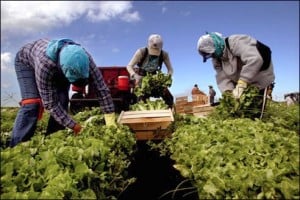
Source: Beyond Pesticides
Ever wonder who harvested the berries in your smoothie? Or who took the effort to pick that big, juicy apple that you’re about to bite into?
Probably not.
And chances are, it was a farmworker. There are currently approximately one million farmworkers employed across the United States.
So how come we never hear about them? And who are these farmworkers exactly?
Most are immigrants working at low-paying agricultural jobs on big farms that sell produce to our supermarkets and restaurant chains: apples, tomatoes, cherries, avocados, potatoes, strawberries, pears – you name it.
They harvest the food that we eat. And yet they are one of the most hidden and underrepresented population subgroups in the nation.
The public knows very little about the conditions under which farmworkers work or the injustices that they face. But some of us know – and it’s not easy to forget once you learn the truth.
Farmworker advocates believe that we should all be aware of how our food is getting to us – and who is being hurt along the way.
Farmworkers Are Being Mistreated in America
Many farmworkers in America have their basic human rights violated every day.
Whether due to unsafe housing provided for them while they harvest, unethically low pay, unsanitary and hazardous work conditions, illegal child labor, rampant abuse of power, the pervasiveness of sexual assault, or a slew of other alarming problems, there is no doubt that farmworkers do not receive the same treatment and legal standing as most American workers.
This fact from the Bureau of Labor Statistics takes my breath away: Every day, at least one farm worker dies on the job, and hundreds more are injured.
The lack of basic knowledge about farmworker conditions in our country may be one of the reasons why these injustices are allowed to continue.
So just how bad are things? Let’s take a look at some of the issues that farmworkers face on a daily basis.
Farmworker Living Conditions Often Lead to Sickness
Some farmworkers are able to live in shared housing with other families offsite of their farms. But many others have to live where they work – on the farms themselves.
The circumstances in farm labor camps vary by location across the nation. Some camps are merely crowded. Others suffer from moldy walls and dilapidated or deteriorating construction.
In some cases, conditions are far inferior.
Reports show multiple families live cramped next to one another with little privacy even for bathing or using the toilet, vermin and cockroach infestations, employer surveillance and intimidation, toxic residue in dwellings, and contaminated drinking water.
These living conditions not only make maintaining a clean and secure lifestyle difficult; they can also cause serious health problems for the workers who experience them.
Overcrowded living quarters contribute to the rapid spread of disease, as does the lack of adequate sewage or garbage removal.
Pesticides carried in on the clothes of workers, sprayed by the landlords for pest control purposes or blown in on the wind from fields and orchards surrounding farmworker housing have been shown to cause serious neurological complications in workers, and especially in their children.
It’s common for adult farm workers to suffer from tuberculosis, skin infections, respiratory illnesses, or intestinal parasites as well. Because of the lack of sanitation and the extremely crowded living situations in their housing, these illnesses are passed from one family to the next in rapid succession.
Migrant farmworkers travel long distances to make money working in the harvest, and living in a farm-provided labor camp will boost their meager earnings.
And despite their hard work, they rarely make enough to move out of labor camps into private apartments with better accommodations.
And while farmworkers earn money during harvest, the seasonal nature of their employment demands that they save every dime for the months they will be without work.
They are financially bound to living in substandard conditions and dealing with the dangerous practices of their employers.
Farm Work Affects Entire Families
Despite the stereotype, farmworkers are not all able-bodied adult men. They are grandparents, women, infants, and growing children as well.
Entire families who come to farms in hopes of finding employment often work and suffer together under miserable conditions.
Farmworker children may suffer the most from the poor conditions in many farmworker camps.
Because of the pesticides that their mothers ingest day in and day out in the fields, many babies are born with mental and physical disabilities.
And if not encountered in utero, kids growing up in camps are still subjected to these same toxins as their brains and bodies develop during childhood.
Some children, whose parents’ farms do not provide housing, are forced to sleep in the beds of trucks or on hard dirt floors under tarps for entire harvests seasons.
Federal child labor laws forbid farm owners from employing children under 12 years of age, and yet there are constantly reports of underage kids in the fields on some of America’s top agriculture farms.
Such backbreaking work is fundamentally dangerous for growing children. Instead of attending school or being able to socialize with friends, farmworker kids often work alongside their parents, spending long hours harvesting in the blistering heat, operating heavy machinery and being exposed to pesticides.
Domestic Violence, Sexual Abuse, and LGBTQIA+ Discrimination Are Prevalent Among Farmworkers
Tragically, farmworker women are more than likely to be victims of domestic abuse and sexual violence. Most live and work in a patriarchal system with traditional gender roles and an entrenched social acceptance of sexual violence.
A 2010 survey of 150 farmworker women in the California Central Valley reported that 80% of the women had been sexually harassed at work.
It is not uncommon for female farm employees to be preyed upon by their supervisors, who spend long days in the fields with them and who have the power to order them into isolating situations on a whim.
Advocates also report that LGBTQIA+ farmworkers are subjected to extreme amounts of workplace violence and discrimination – not only from their peers, but also from the management in some cases.
Most frightening of all, says Equal Employment Opportunity Commission regional attorney William Tamayo, is the staggering amount of victims who do not even come forward in the first place.
Fear of Retribution
We know that many farmworkers suffer abuse by their employers, supervisors, and landlords who take advantage of farmworkers’ poverty, cultural structures, gender roles, housing situations, immigration status, language deficiencies, or fear of law enforcement to wield dominance over them.
But why don’t they speak out against the abuse?
Most commonly, because they are afraid of retribution from their bosses.
Government officials and police are more likely to investigate work camps and agricultural employers if they receive an official complaint.
However, because many workers fear that speaking out about problems at work will result in their eviction, deportation, or firing, most farmworkers keep silent.
Maricruz Ladino, a farmworker who was bullied and raped by her supervisor in 2006, told NPR why she did not come forward for seven months after her attack: “I saw my choices,” she said. “I lose my job, I can’t feed my family.”
After finally speaking up, Ladino was expeditiously fired by the management at her farm. Even after winning the civil suit she eventually filed against them (with the help of a legal assistance organization), her former employers were never punished nor identified, and her rapist faced no criminal charges.
Immigration status is a huge player in the equation as well.
With over 50-60% of farmworkers being undocumented, sometimes all it takes is a threat to call immigration enforcement officials to put workers at an egregious power imbalance with their employers or landlords.
These are harsh realities.
Although both state and federal laws do exist to protect workers whose contracts have been violated, who are being intimidated, or who are subject to dangerous working or living conditions, there are many barriers that prevent farmworkers from discovering their rights in the first place.
Moreover, the existence of these laws does little to stop them from being broken by many agricultural employers.
The Language Divide
To make matters even more difficult, the majority of farmworkers also have to contend with a language barrier.
Most do not speak English as their first language. Some do not even speak Spanish as their primary language, but are instead fluent in any number of indigenous languages common in Mexico or other nations in Central and South America.
To be specific, 81% of farmworkers speak Spanish, 18% speak English, and 2% speak other languages, including Tagalog, Creole, and Thai. A stunning 60% of farmworkers not born in the United States cannot speak or read English at all. And only 35% are able to speak a minimal amount of English.
This lack of basic language ability makes it unquestionably hard for farmworkers to get legal help when they face poor treatment from employers. It makes receiving the necessary medical care for injury or illness near impossible. And it isolates victims of domestic violence and sexual assault from community services that can help.
Purchasing for Change
Now that we know a bit more about the injustices in farmworker employment, is there any way that we as consumers can change the market by purchasing strategically?
Animal advocates have fought to set high standards for what food can be labeled as humanely raised. And there are strict rules for which food products can be called certified organic.
The only equivalent for worker treatment in America is the fair trade movement.
Organizations such as Fair Trade USA and the Fair Trade Federation have created standards for companies to qualify as fair trade. Products that earn the organizations’ logos must come from farmers and workers who are justly compensated. Income from sales of Fair Trade USA products go to teaching disadvantaged communities how to use their free market advantage.
Check out the Fair Trade USA website for a list of certified fair trade products and partners and to learn more.
However, unlike the organic label, there is not a huge call for fair trade products from the general populace, in part because farmworkers are such an underrepresented population.
Awareness must increase for Americans to realize that purchasing fair trade matters – and why it does.
Farmworkers Need a Voice
American farmworkers are undoubtedly a marginalized population who lack proper legal and social representation.
National organizations like the Association of Farmworker Opportunity Programs, the National Center for Farmworker Health, Farmworker Justice, and the National Employment Law Project advocate to get farmworkers the representation that they need.
By providing well-trained legal staff that speaks Spanish and other languages, they bridge the looming linguistic divide in order to represent workers in legal cases against abusive employers.
By presenting opportunities for farmworkers to get basic healthcare needs met, they mitigate the dangerous conditions in which these workers live and toil.
Not only this, but farmworker advocacy groups offer farmworker education, as well as information about and access to job training and safety programs for workers.
Overcoming the lack of awareness among the actual farmworker community about these resources is a huge struggle. Most farmworkers don’t have access to the Internet. Most don’t have a great deal of education, and many haven’t even graduated from high school. In fact, studies conducted by the National Agricultural Workers Survey indicate that the average completed educational level for farmworkers is seventh grade.
Without ways to access information about programs and organizations that can help, farmworkers remain stuck.
***
Take a moment to reflect on how you might react to this article if it were your own family getting up at five o’clock in the morning to pick berries for twelve hours at a substandard wage, to suffer from supervisor intimidation and manipulation, to live in crumbling homes with no privacy, and to fear for their safety every day at work.
The situation won’t get better if no one knows about the injustices that farmworkers suffer.
Encourage your friends to think about where their food comes from. Hopefully in doing so, they will be inspired to help us bring farmworker exploitation out of the darkness.
[ultimatesocial_facebook custom_class=”fb-btn-us”] [ultimatesocial_twitter custom_class=”tw-btn-us”]
Want to discuss this further? Login to our online forum and start a post! If you’re not already registered as a forum user, please register first here.
Danica Johnson is a Contributing Writer at Everyday Feminism and the Communications Manager at the Coalition on Human Needs, an alliance of national organizations working together to promote public policies addressing the needs of low-income and other vulnerable populations. Living in Washington, DC, this West Coast native uses her free time to write for her blog Duckyfem, practice yoga and spend as much time with animals and in nature as possible. Follow her on Twitter @duckyfem and read her articles here.
Search our 3000+ articles!
Read our articles about:
Our online racial justice training
Used by hundreds of universities, non-profits, and businesses.
Click to learn more
Most Read Articles
- « Previous
- 1
- …
- 30
- 31
- 32



















